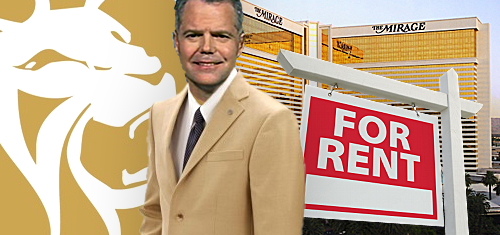 Casino operator MGM Resorts International reported better than expected Q3 earnings while finally revealing its plans to hop on the real estate investment trust bandwagon.
Casino operator MGM Resorts International reported better than expected Q3 earnings while finally revealing its plans to hop on the real estate investment trust bandwagon.
MGM reported net income of $66.4m in the three months ending Sept. 30, compared to a $20.3m loss in the same period last year.
Of the three US casino operators doing business in Macau, MGM is by far the least reliant on its Asian operations. So while MGM China’s numbers were bad – revenue down 33% to $529m and earnings down 40% to $128m – its performance was overshadowed by good growth at MGM’s US operations.
Revenue at MGM’s wholly owned domestic properties rose 4% to $1.6b, while earnings were up 25% to $411m. Casino gaming revenue improved by 4% as a 2% rise in slots handle offset a 1% fall in table drop. Room revenue rose 8% as occupancy improved one point to 96% and average daily room rates rose $10 to $141.
MGM China, in which MGM Resorts holds a majority stake, reported mass market table revenue down 30% while VIP table revenue fell 39%. VIP table drop was down even more (55%) but VIP hold improved a full point to 3.7%, well above the theoretical win range.
Income from unconsolidated US affiliates more than doubled to $57.5m, largely as a result of the CityCenter property in Las Vegas swinging from a $6.7m loss last year to a $16.5m gain. MGM’s 50% stake in Atlantic City’s market-leading Borgata casino was up nearly 50% to $31.8m.
REIT TO THE RESCUE
MGM’s bigger announcement came via its new real estate investment trust (REIT), which it’s calling MGM Growth Properties (MGP). The plan is for MGP to acquire the land on which 10 of MGM’s premier properties reside, for which MGP will take on around $4b of MGM’s $12.8b long-term debt load.
MGM will retain around a 70% stake in MGP while the remaining shares will be flogged on the New York Stock Exchange, from which the company expects to raise a further $1b. Assuming all goes as planned, MGM hopes to complete the deal before the end of Q1 2016.
The 10 properties include six Las Vegas resorts, including the Mirage, Mandalay Bay, Monte Carlo, New York-New York, Luxor and Excalibur, which together account for 42% of MGM’s domestic revenue. The MGM Park entertainment district in Las Vegas will also be included along with MGM Grand Detroit and Mississippi properties Beau Rivage and Gold Strike Tunica.
MGM will lease the properties from MGP under a 10-year master lease with four five-year extensions at MGM’s option. The master lease will allow MGP right of first refusal on MGM’s in-development casinos in Maryland and Massachusetts.
MGM Resorts CEO Jim Murren (pictured) will act as MGP chairman, but said the new firm would look to hire “people with real estate experience” to flesh out its executive ranks.
MGM has been under pressure from investor Johnathan Litt and his Land & Buildings Investment Management firm to follow the REIT path laid down by some of MGM’s US competitors, like Penn National Gaming. Caesars Entertainment also hopes to go down the REIT route should its main unit ever emerge from bankruptcy.
